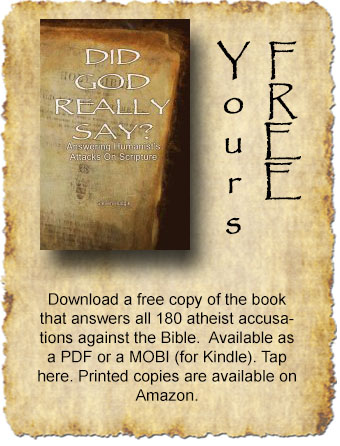Atheist's Attacks
Answering Humanist's Accusations Against the Bible


Humanists Refuse The Evidence of Miracles
Is the Belief in the Supernatural Harmful?
THE HUMANIST'S CLAIM: The Harms of the Supernatural Outlook
Because of believing that supernatural beings control the world, people have often misdirected their energies in attempting to solve problems. Instead of studying the world to discover scientific solutions to problems, they performed religious activities in an effort to obtain the assistance of benevolent supernatural beings or thwart the influence of malicious ones.

This misdirection of energies is seen, for instance, in the history of the attempts to prevent the outbreak and spread of diseases in Europe. The historian Andrew White relates that, during many centuries in the Middle Ages, the filthiness of European cities repeatedly caused great plagues that sent multitudes to their graves..
Humanists must be desperate to try this argument. The premise is false, and even if it were true, it provides no proof nor evidence that supernatural miracles never happened. At best, a humanist might say, "I don't like that supernatural miracles happened, because I believe they harmed people." It is a belief they could hold, but it is not in accordance with historical reality.
Does the following humanist’s description sound anything like Biblical Christianity?
...they performed religious activities in an effort to obtain the assistance of benevolent supernatural beings or thwart the influence of malicious ones.
This is not Christianity. Not at all. It is describing people who follow pagan gods, including Hindu gods and Buddhists trying to increase their karma. These types of beliefs are part of the reason why technological progress was limited prior to Christianity. People believed in capricious and arbitrary gods who needed to be bribed, cajoled, and tricked into helping humanity.
Dear humanist: don't use examples from paganism to try to discredit the Bible.
An example of a “misdirection of energy” given by the humanist writer, are the filthy conditions in European cities during the Middle Ages. The lack of sanitation contributed to multiple out-breaks of disease resulting in death.
That there were unsanitary conditions is a true statement. The lie is that these conditions existed because people engaged in reli-gious activities (taught in the Bible) instead of using science to discover scientific solutions. The fact is the opposite is true. The poor sanitary conditions resulted from people applying the scientific knowledge of the day. If they had followed what the Bible teaches, the poor sanitary conditions would not have existed.
People (science) in the Middle Ages did not know that filth was bad... nor that filth was the source of disease. They did not know about microbes, germs, and viruses. It is also true that people at the time of Moses also did not know these things. Yet, the Mosaic Law includes provisions concerning cleanliness, sanitary practices, and appropriate treatments for people with infectious diseases that were practical and effective at stopping the spread of disease.
People did not know about germs, but God did. Through His law He told people how to protect themselves and others from dis-ease and infections.
During the 14th century, the bubonic plague spread throughout Europe. Many Jews followed the sanitary laws of the Bible as a normal part of a Biblical lifestyle. The Jewish death rate from the plague was half, and in some places possibly as low as 5%1 that of the Gentile (non-Jewish) population. The Gentiles ignored the Bible and… unfortunately, they died in much greater numbers. Arturo Castiglioni writing in "A History of Medicine" notes that:
“The laws against leprosy in Leviticus 13 may be regarded as the first model of a sanitary legislation." (1941, page 147)
People did not live in filth in the Middle Age because they believed in the supernatural. They lived in filth because they did not know what the Bible taught, and turned to other means to try to protect themselves from the plague. Yes, people employed supersti-tious practices such as flagellation, burning incense, and sitting be-tween two fires. People also believed the plague was a punishment sent by God. However, because people believed in and practiced these things, does not make them Biblical. If they had followed what the Bible taught, many fewer would have died.
Conclusion: The humanist assumptions that belief in the supernatural negatively affects human activity are not supported by historical reality.
But they have still more to say on this topic: Based on biblical teachings, Christian theologians during those centuries thought the plagues were caused by the anger of God or the malevolence of Satan. The Bible gave them ample support for their belief. It contains numerous instances of God punishing people by means of pestilence (e.g., Exodus 32:35; Numbers 16:44-49; Jeremiah 21:6). And in describing Jesus’ healing miracles, the New Testament attributes the following afflictions to demons: blindness (Matthew 12:22); muteness (Matthew 9:32-33); lameness (Luke 13:11,16); epilepsy (Matthew 17:14-18); and insanity (Mark 5:1-13).
Does God use disease as a punishment? Do demons cause disease? Get the answer... click here.
Footnote 1: Because they did not get sick as often as Gentiles, the Jews faced persecution and many were killed. The Jewish History web site reports that: “It is hard to tell whether proportionally more Jews died from the plague or the persecutions. The Christians claimed that the Jews died [from the plague] at only half the rate of Christians… It can be attributed to the sanitary practices [of] Jewish law. Jewish law compels one to wash his or her hands many times throughout the day… At least once a week a Jew bathed for the Sabbath… The sanitary conditions in the Jewish neighborhood, primitive as it may be by today’s standards, was always far superior to the general sanitary conditions.” – www.jewishhistory.org/the-black-death
GOD KNOWS YOU...
HE KNOWS EVERYTHING!

You cannot hide anything from God, and you can't hide from God:
'Can a man hide himself in hiding places So I do not see him?' declares the LORD 'Do I not fill the heavens and the earth?' declares the LORD. - Jeremiah 23:24
Imagine you have an SD card in your head that records every thought and dream. We record for a month and then rent a theater. All your friends are invited as we play that SD card on the big screen. How would you feel?
That's what God sees. He is disgusted and knows that because of your sin (those thoughts we all see on the big screen) you will never be with God. But God still loves you, and He made an incredible sacrifice for you. He died in your place.
You have a choice. Reject God... and get what you say you want... you'll spent eternity separated from God. And that means separated from EVERYTHING that is good. Think about that.
Or accept the gift God offers... trust that Jesus Christ died on the cross to pay the penalty you've earned (remember those thoughts on the SD card). Jesus paid your penalty in full. It is finished
There is no darkness or deep shadow Where the workers of iniquity may hide themselves. - Job 34:22
